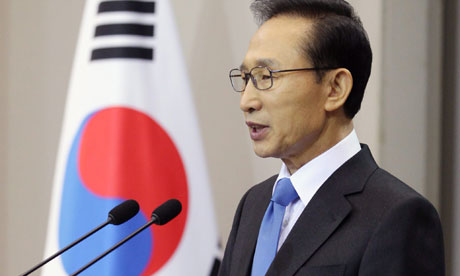South Korea warns North Korea against further provocation
President Lee Myung-bak says he feels he failed to protect citizens, as China seeks urgent talks on crisis in peninsula
 South Korean President Lee Myung-bak makes a special statement regarding North Korea's attack on Yeonpyeong Island. Photograph: Yonhap/EPA
South Korean President Lee Myung-bak makes a special statement regarding North Korea's attack on Yeonpyeong Island. Photograph: Yonhap/EPASouth Korea's president said early this morning he felt responsibility for failing to protect citizens from North Korea's shelling last week and warned the North against further provocations.
Lee Myung-bak described Tuesday's shelling of a tiny South Korean island, which killed four people, as an "inhumane crime".
As Lee spoke, a nuclear-powered US supercarrier and a South Korean destroyer held joint military exercises. The show of force came almost a week after the attack on Yeonpyeong Island killed four, including two civilians, and sent tensions soaring in the region.
China has called for a meeting of the six nations involved in the stalled North Korean denuclearisation talks.
South Korea and Japan gave a tepid response to the proposal today. Analysts believe negotiations are the most plausible outcome of the conflict, but predict it will take time for the parties to come to the table. The North Korean artillery attack was the most serious incident since the sinking of a warship by what was found to be a North Korean torpedo.
Media in Seoul reported today that the North had placed missiles on launch pads in the Yellow Sea, as the South and the US mounted a show of force with joint military drills in the area.
Beijing, which objected to the exercises, sought a return to diplomacy, with its nuclear envoy calling for an urgent meeting with the nuclear negotiators from North and South Korea, Japan, the US and Russia. Wu Dawei said it would not be a resumption of the six-party talks but might "help create the conditions" for them to restart.
Seoul said it would "carefully consider" China's suggestion, a remark read by many as in effect a rejection. President Lee Myung-bak's office said earlier that he had told a visiting Chinese delegation Beijing should contribute to peace in a "more objective and responsible" manner.
China, the North's main ally, has not criticised Pyongyang over Tuesday's attack, merely urging all those involved to show restraint. Critics say it should be pushing harder, given the North's dependence on Chinese food and energy.
"I can see why China is doing this: 'We don't want war; we don't want to put pressure on North Korea'," said James Hoare, former British chargé d'affaires in Pyongyang. "It would be a good thing if they did start talking, but I think it will take a little bit more time before anything will happen.
"I suspect in the end it won't quite blow over, but it will calm down and the two sides will find some formula to back away from the immediate confrontation."
Andrei Lankov, an expert on the region at Kookmin University in Seoul, believed the six-party talks would resume "sooner or later" but suggested they were largely irrelevant to the current crisis, because the real question was whether and when South Korea and the US would provide more aid to the North. "This is a protection racket – you pay the local toughs, and if you don't your windows are going to be broken," he said.
Relations on the peninsula deteriorated sharply when Lee took office in 2008 and cut off free-flowing aid to the North. But Tuesday's attack marked a new level of hostility. The North said that civilian deaths "if true … [are] very regrettable", but blamed the South for using its citizens as human shields. It also accused the US of setting up Tuesday's incident to justify today's drills.
The drills are the largest of their kind yet, according to the South's Yonhap news agency, involving an aircraft carrier carrying 75 planes and at least four other warships. But US military officials said the training was routine and no live-fire exercises were planned. According to South Korean media they are taking place far south of the disputed maritime border.
Pyongyang's National Peace Committee said in a statement that the manoeuvres were creating "a state of ultra-emergency". It also renewed its threat of "merciless counter-military strikes", although it often makes similar warnings ahead of such exercises.
Yonhap said North Korea had moved surface-to-surface missiles to frontline areas, but military and government officials said they could not comment.
"It is impossible to confirm the report as it is classified as a military secret," one told Reuters.
An unidentified government source also told Yonhap that the North had deployed surface-to-air missiles along its western coastline, apparently targeting fighting jets near the disputed Yellow Sea border.
Yesterday, South Korea's marine commander vowed "thousand-fold" revenge if the North attacked again.
Earlier today the South Korean government ordered journalists to leave Yeonpyeong for safety reasons, but bad weather forced it to abort an attempted evacuation, leaving about 400 people there.
No comments:
Post a Comment
Note: Only a member of this blog may post a comment.